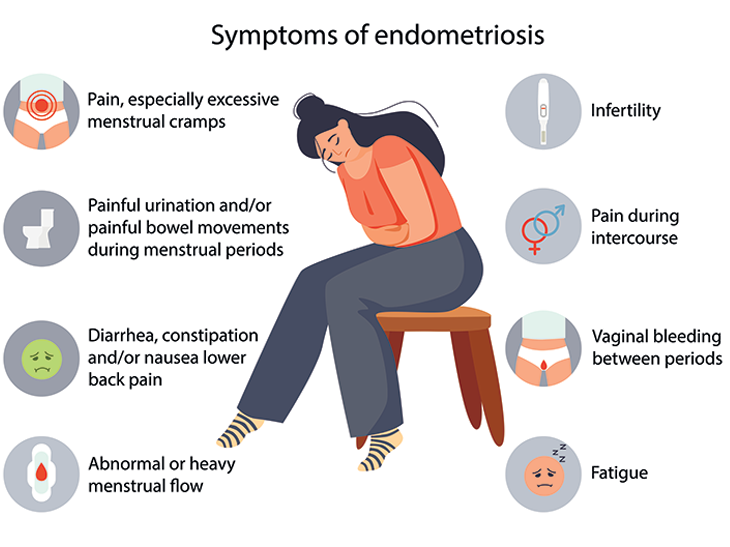
Endometriosis is a chronic and often painful gynecological disorder that affects millions of women worldwide. This condition occurs when tissue similar to the lining of the uterus, known as the endometrium, grows outside of the uterus. In this article, we will explore the symptoms, diagnosis, and treatment options for endometriosis.
Symptoms
Endometriosis can present with a variety of symptoms, although some women may be asymptomatic. Common symptoms include:
Severe pelvic pain
Painful periods (dysmenorrhea)
Chronic lower back or abdominal pain
Pain during or after sexual intercourse
Excessive bleeding or irregular menstrual cycles
Infertility or difficulty getting pregnant
Digestive problems such as bloating, nausea, or constipation
If you experience any of these symptoms, it is important to consult with a healthcare professional for further evaluation.
Diagnosis
Diagnosing endometriosis can be challenging due to the variability of symptoms and the lack of definitive diagnostic tests. However, there are several methods commonly used for diagnosis:
Medical history and physical examination: Your doctor will discuss your symptoms, perform a pelvic exam, and assess any abnormalities such as tender nodules or cysts.
Imaging tests: Transvaginal ultrasound or MRI scans may be used to visualize the pelvic area and identify any abnormalities.
Laparoscopy: This minimally invasive surgical procedure allows the examination of the pelvic organs using a small camera inserted through a small incision in the abdomen. It is considered the gold standard for diagnosing endometriosis.
It is crucial to receive an accurate diagnosis as early as possible to ensure the most effective treatment plan.
Treatment
Treatment for endometriosis aims to alleviate symptoms, slow the progression of the disease, and improve fertility if desired. The choice of treatment depends on factors such as the severity of symptoms, the extent of the disease, and the individual’s reproductive plans. Here are some common treatment options:
Pain medication: Over-the-counter pain relievers such as ibuprofen or naproxen can help alleviate mild to moderate pain. In more severe cases, prescribed pain medications may be necessary.
Hormonal therapy: Hormonal medications, such as birth control pills, may be prescribed to regulate hormone levels, control menstrual bleeding, and reduce the growth of endometrial tissue.
Nonsteroidal anti-inflammatory drugs (NSAIDs): NSAIDs can provide pain relief and help reduce inflammation associated with endometriosis.
Surgical intervention: Laparoscopic surgery can be performed to remove endometrial implants, scar tissue, or cysts. In severe cases, a hysterectomy (removal of the uterus) may be recommended.
Fertility treatment: If endometriosis is causing infertility, techniques such as in vitro fertilization (IVF) or assisted reproductive technology (ART) may be utilized to increase the chances of conceiving.
It is important to consult with a healthcare professional to discuss the most suitable treatment approach based on individual circumstances.
Lifestyle Management
In addition to medical treatments, certain lifestyle modifications can help manage endometriosis symptoms and improve overall well-being:
Exercise: Regular physical activity can help reduce pain and inflammation associated with endometriosis. Consult with a healthcare professional to tailor an exercise plan suited to individual needs.
Diet: Adopting an anti-inflammatory diet rich in fruits, vegetables, whole grains, and lean proteins may help alleviate symptoms. Some individuals find reducing or eliminating dairy, gluten, and caffeine to be beneficial.
Stress management: Stress can exacerbate endometriosis symptoms. Engaging in stress-reducing activities such as meditation, yoga, or counseling can be helpful.
Support groups: Joining a support group or seeking therapy can provide emotional support and a platform to share experiences with others who understand the challenges of living with endometriosis.
Conclusion
Endometriosis is a complex condition that can significantly impact a woman’s quality of life. It is essential to recognize the symptoms, seek timely diagnosis, and explore appropriate treatment options. With proper medical care, lifestyle adjustments, and emotional support, women with endometriosis can effectively manage their symptoms, improve fertility outcomes, and lead fulfilling lives.





